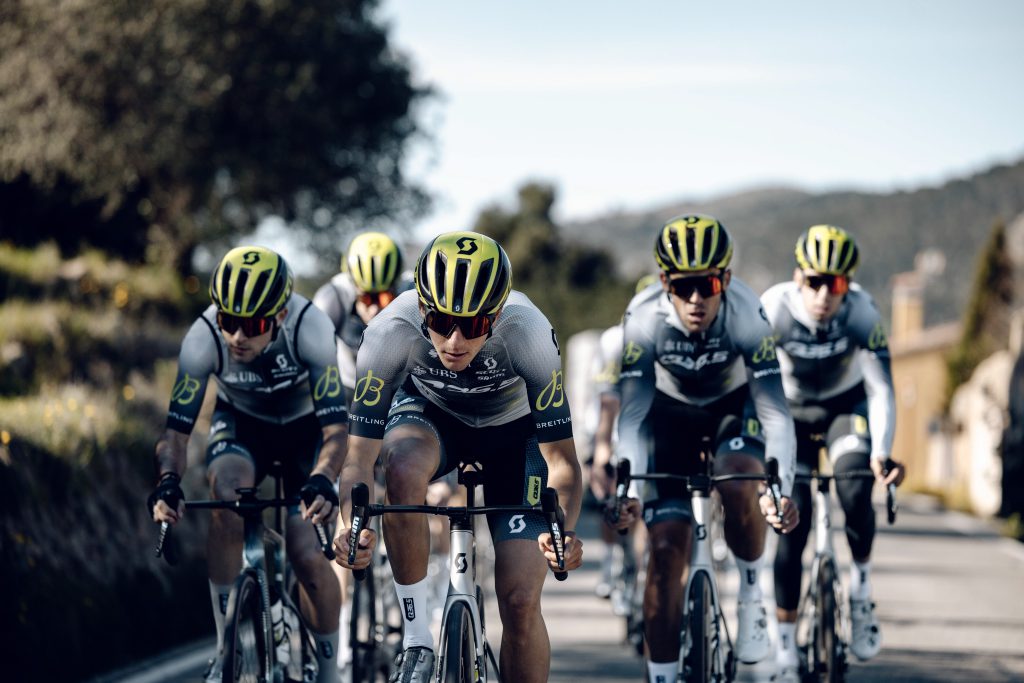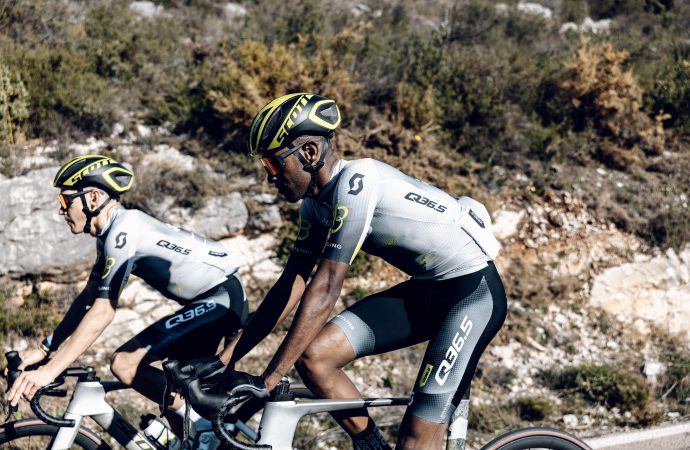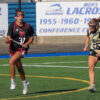Douglas Ryder, general manager of the Q36.5 Pro Cycling Team, explains why it’s not just the winning that matters
Ever since the inception of sport, its seeds have always been pitting humanity’s greatest athletes against one another for entertainment, but should the industry be utilising the stage presented by modern technology to prioritise social agendas to the same extent, or perhaps even more than, competing for victory?
Most sports organisations in 2023 have CSR agendas. It goes without saying that the extent to which they are carried out varies dramatically – some merely engage here for compliance or marketing, while others build their entire identities around it.
One such organisation is Q36.5 Pro Cycling Team, thanks to its general manager and former professional cyclist Douglas Ryder.
“With progress at the heart of who we are, our goal is also to help communities grow sustainably using the upward mobility that bikes offer,” the South African says. “Bikes don’t only bring people together; they also help move them forward.”
The core of the team’s agenda focuses on mobility, education, and development in Africa, but despite Q36.5 being a new team at the Pro-Continental level (road cycling’s second tier) for 2023, the strategy hasn’t coincided with the increasing popularity of CSR initiatives. Or, as Ryder puts it: “This isn’t a black swan event.”
Q36.5’s roots go back to 2007, when Team MTN (a South African multinational mobile telecommunications company) was established at the Continental level. By 2013, the team had progressed to the Pro-Continental level, becoming Africa’s first professional cycling team registered by the Union Cycliste Internationale (UCI), the sport’s governing body. It immediately found success with Gerald Ciolek’s memorable victory at Milan-San Remo, one of road cycling’s five ‘monuments’ – the most prestigious one day races in the sport.
In 2015, now re-named MTN-Qhubeka, the team became the first African squad to take part in the Tour de France. Steve Cummings won stage 14, the team’s first and a poignant success on Mandela Day.
But why this success was especially significant – and why Ryder said that “it was always my dream to be able to call the team Qhubeka” – is because Qhubeka wasn’t the team’s sponsor. In other words, they didn’t provide funding to the team.
Rather, since the early 2010’s, the team raced to raise awareness and funds for Qhubeka. A Nguni word meaning ‘to progress’ or ‘to move forward’, Qhubeka is a South African not-for-profit organisation that donates bicycles throughout Africa. The charity’s bicycles are a tool for healthcare workers and schoolchildren, helping people to travel faster and further, increase community safety, generate income and carry more.
The team embodied Qhubeka’s ethos as they gained a World Tour license in 2016, becoming the first African team to enter cycling’s top division. The team was renamed ‘Team Dimension Data for Qhubeka’ (information technology services company based in Johannesburg). Another renaming occurred again in 2020 as Team NTT (the holding company of Dimension Data), but suddenly faced an uncertain future as NTT notified the team that they were discontinuing their sponsorship.
From 2021, Qhubeka returned to the title as ‘Team Qhubeka Assos’ (a Swiss cycling clothing brand) and then Qhubeka NextHash (financial digital securities) just before the Tour de France, but as financial problems returned at the end of the year, the UCI announced that the team would not receive a World Tour license for 2022. Essentially, the team was forced to fold, with the Continental-level development team, Team Qhubeka, all that was left.
“I mean, it was really sad that our team couldn’t exist last year,” Ryder says. “I was gutted actually, at a time when the world needed to care about itself and about humanity. A team that cares more than anybody about humanity and their opportunity couldn’t survive. I thought when we called our team ‘Qhubeka’ I would buy some time, people would feel more confident, and then we would find the funding. I still question every day how that happened. Were we not relevant enough? Was our messaging not good enough?”
Team Qhubeka now acts as the development squad for Q36.5 (a cycling clothing brand and garment provider for the team), but despite Qhubeka no longer being in the team’s name, it will still be supporting them.
“As long as I’m breathing, I’ll be racing for a purpose and using our success to do these things”, Ryder adds. “We’ve raised over €6 million for the charity – that’s 115,000 more kids on bikes now. I mean, it’s an amazing, amazing thing. The global awareness of Qhubeka came about through the team, but that didn’t bring us any. We needed a title partner because cycling is run 100% on commercial partners and we need sponsorships to survive. But that doesn’t mean that we’re not racing for Qhubeka anymore.”
While the registered country of the team has moved from South Africa to Italy – where Q36.5 is based – there is still great emphasis on developing African cyclists.
“Negasi Abreha has come from that [Team Qhubeka] and he’s only the second Ethiopian rider to ever make it in the sport after Tsgabu Grmay, who also came through our programme,” tells Ryder. “We had 55 African riders in the last 10 years come through our programme, which is amazing. That’s more than other teams have done for their local area.”
When considering all the challenges faced by African cyclists to reach the start line, and then find success in the professional ecosystem, this is a truly impressive achievement. “Right now, it’s sad that we don’t have any South Africans in the team and only one African,” Ryder continues, “but it shows that all of our African riders that we’ve had on the team in the past moved into new jobs, which is great.”
When Eritrean and former MTN-Qhubeka rider Daniel Teklehaimanot wore the ‘King of the Mountains’ polka dot jersey at the 2015 Tour de France for three stages, his compatriot Biniam Girmay was 13-years-old. The now 22-year-old is one of the brightest young talents in road cycling and has achieved success at the highest level, but although never associated with Ryder’s team, he knows that Teklehaimanot’s time in the spotlight had a huge impact on Girmay.
“It was so big in Eritrea. Heroes drive interests, desire, passion and creates hope and opportunity. We’ve played a big role in the last 15 years in terms of where African riders are today, for sure. We bet our business on it.”
Q36.5 have continued inspiring African cycling’s next generation, not least by winning a stage at last month’s Tour du Rwanda, but the long-term support of Africa from Ryder’s team in all its forms has drawn the eyes of the wider sporting world towards the region, where Rwanda will host the Cycling World Championships – the continent’s first – in 2025.
While a rider of Girmay’s calibre is capable of winning the rainbow bands, Ryder has higher hopes for Africa’s first ever world champion and has his sights set firmly on the team returning to the World Tour to raise more funds.

Q36.5’s mission of ‘Racing the Future’ will ‘guide the team to be focused and conscious of the impact and contributions our decisions have on the professional sport, the environment, and the people we meet along the way’, which Ryder hopes will attract an increasing number of aligned partners.
“Our business is built on its people, so how do we make a positive impact through the passion of the individuals that are on this team? We’re about performance, we’re about innovation, we’re about change, and we do this by engaging with partners that care about the world that we live in, that want to use their organisations and their people to make a meaningful difference. If you look at our new team bus, that through our partnership with Mercedes Benz, we’re putting solar panels on the roof, we’re doing things to try and make this credible and to help in any way that we can.”
But while Ryder recognises the massive commercial potential associated with cycling’s connection to daily society as a sustainable transport method, he notes the wider lack of investment in the sport as problematic: “I think it’s misunderstood”, he claims. “It’s a massive sport. It touches so many people. You can ride a bike with the best of the world virtually and physically, but you can’t necessarily play football with Ronaldo or Messi or drive a car with Lewis Hamilton or Max Verstappen. So I think cycling has massive potential there which just hasn’t been harnessed in its true sense.
“I just wish it would get more funding across the board. Women’s cycling is taking off, which is so brilliant to see, but why aren’t more big corporates getting involved? Of course, people talk about its credibility of its past. But every sport has had a dark past and cycling has moved well beyond that. It’s in a much better space.”
But to make this future that Ryder envisions come to fruition, Ryder isn’t just relying on his team’s partners: “When we talk to our riders about that [sustainability], people want to ride for our team because it races for something bigger. We asked the riders what we could do differently to make sure that we don’t use so much water or so many plastics, and they’ve all come up with ideas. When you get the buy in from the individual, it makes a massive difference. It unites us together in a different way. Sport can be pretty inhumane in a way, so it’s nice to have attracted those guys and to get their insight. They’re all young, still, which is which is cool.”
The team’s purpose of racing for something greater away from the road can, in fact, influence what happens on it. Steve Cummings described the team’s purpose of riding for Qhubeka as providing a greater sense of freedom when racing.
Indeed, the team’s emphasis on the individual directly pays dividends on the road – riders like Carl Fredrik Hagen who have been ‘domestiques’ at the World Tour level have their chance to shine with Q36.5. This philosophy is how Qhubeka-Assos won three stages at the 2021 Giro d’Italia, the most of any team.
“We believe in the individual. They’re not a function that fulfils a role; they’re an individual human being with dreams and objectives.”
This ideology is why Ryder describes former grand tour contender Fabio Aru’s swansong year with the team so positively: “He loved this team so much. He wished that he started with this team early in his career, the way we treated him, the lack of pressure, the support. He went mentally through hell and back in the teams that he’d been on in the past.”
Focusing on individuality, on sustainability – such topics are undoubtedly more prevalent in the wider consciousness of younger generations than they once were, but still not enacted on the same level as Ryder. I asked him what needs to change for racing with a purpose to become more prevalent in sport.
“The world needs to change. Sport is a lot about ego and not much about impact. Cycling is a team sport, you can’t do it as an individual, especially road cycling, so that does bring unity and connection. But I do think that every partner that wants to be involved in sport is asking what good does this do to the planet, and I think that’s employees in those organisations being authentic and genuine. Every partner that wants to join our team actually talks about what we enable through our team. Those conversations never happened before. It was all about brand visibility, performance, winning, big brand riders etc. It was never about outputs and what they could get from it. So I think more and more teams, and more and more different sporting codes, will start to think about this top of mind, which is exactly what needs to happen.”
Other teams, however, are beginning to mobilise and improve this. Israel Premier Tech have done some stuff in Rwanda to build a pump track to get kids on bikes and INEOS are doing something with Eliud Kipchoge foundation in Kenya to get more people on bikes, Ryder says.
“We kind of pioneered this journey and I think there are people that are taking notes and seeing the value of that. Of course, it needs to be genuine; you can’t just put it in a press release and then walk away.
“When we started with Qhubeka, how many people cared about using their success in sport to help somebody else? I mean, we were way ahead of our time. And I think that’s why our team is so authentic and genuine is that we didn’t wait for Black Lives Matter or another event to change our mindset. We did it from the outset, from the beginning. And that just talks to the credibility that we have, how much we care, and how authentic and genuine our story is, and will continue to be.”
As the sporting landscape continues evolving and agendas away from competing like sustainability become more mainstream, the future of Ryder’s team should, in theory, be safer. Their continued manifestation of Qhubeka – ‘to progress’, ‘to move forward’ – what would it say about both the sporting industry and wider society if such a team cannot only survive, but inspire other businesses from all sectors to be influenced by their philosophy?
Opt into our weekly newsletter for exclusive content focused on sustainability strategy, communication and leadership for sport’s ecosystem.










Leave a Comment
Your email address will not be published. Required fields are marked with *